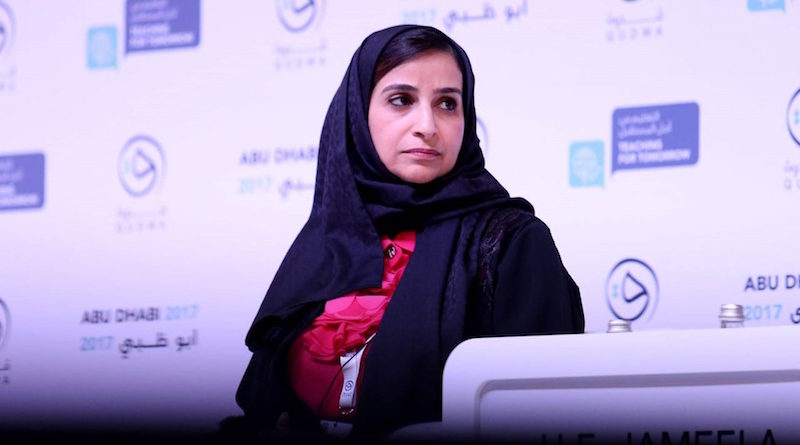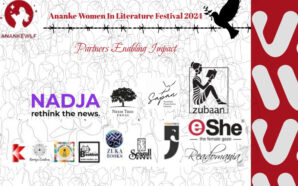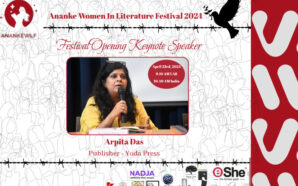Abu Dhabi (UAE) October 8th, 2017 – Teachers hold the key to fuelling sustainable growth, building social cohesion and stability, and promoting tolerance and equality, a plenary session themed ‘Equity in Education: Delivering on SDG4’ highlighted on Day 2 of Qudwa 2017 Global Teachers’ Forum in Abu Dhabi.
Exploring the role of education as a building block to creating a better, more sustainable world, participants discussed how teachers can ensure inclusive and quality education for all and promote lifelong learning.
Panellists included Her Excellency Jameela bint Salem Al Muhairi, UAE Minister of State for Public Education, Julia Gillard, Chair of the Board of Directors of the Global Partnership for Education and former Prime Minister of Australia, and His Excellency Dr Ali Rashid Al Nuaimi, Chairman of the Abu Dhabi Department of Education and Knowledge (ADEK) and Member of the Abu Dhabi Executive Council.
Introducing the session, presenter Jessy El Murr, Producer and TV Reporter at Sky News Arabia, said: “Education is defined as the golden thread that runs through all 17 UN Sustainable Development Goals (SDGs). Teachers are seen as critical to the success of SDG 4.”
Kicking off the discussion, moderator Vikas Pota, Chief Executive of the Varkey Foundation, said: “Whatever the question, education is the answer.”
Her Excellency Jameela bint Salem Al Muhairi said: “Education is critical for every single human being on earth and one of the basic human rights, therefore SDG 4 is an objective for all. The UAE places high priority on sustainable development around the world. Earlier this year, our government established the National Committee on Sustainable Development Goals, presided over by Her Excellency Reem bint Ebrahim Al Hashimy, Minister of State for International Cooperation. The National Agenda of the UAE Vision 2021 is also based on the SDGs.”
She added: “Two weeks ago, our leadership launched the UAE Strategy for the Fourth Industrial Revolution that aims to lead our next generation into the future. At the centre of this strategy are people. There is a question that we always come back to – what will the school of the future look like? Is it going to be virtual? Are robots going to replace teachers? Whatever the answer may be, in the UAE we believe that skills, education, knowledge, values, principles and technology form the basis of our future. With regard to technology, the UAE is already playing a leading role as we gear up for the Fourth Industrial Revolution.”
Her Excellency Jameela bint Salem Al Muhairi: “Skills, education, knowledge, values, principles and technology form the basis of our future”
Julia Gillard: “I commend the UAE for being so thoughtful about the subject of education”
His Excellency Dr Ali Rashid Al Nuaimi: “Students are the future leaders of every country”
Speaking on her role on the board of Dubai Cares, a philanthropic organisation working to improve children’s access to quality primary education, Her Excellency Jameela bint Salem Al Muhairi said: “Dubai Cares was established with the aim of offering financial aid and creating opportunities for students. Ten years later, we have implemented projects that changed the lives of 16 million children in developing countries. We have trained educators and teachers, and built schools in their communities. In partnerships with the Varkey Foundation and the Bill & Melinda Gates Foundation, we want to make sure that every child in the world will have access to education. The UAE is among the top 10 countries in the world that are active in this field.”
Calling for change in our approach to education, Julia Gillard said: “If we stick with business as usual, we are going to wake up in 2030 and see 800 million young people leaving schools with less than secondary-level skills. On the other hand, we have the technological revolution creating many jobs that require highly qualified professionals. This mismatch between low skills and high demands of the job market leads to poverty and lost hope around the world. Across the globe, even in the wealthiest nations in the world, there are marginalised children that are being left behind.”
She added: “In my capacity as Chair of the Global Partnership for Education, I aim to solve the financing challenge. But it’s not just about the money. The countries that are building their education systems today do not have to go through all the challenges we in developed countries have been through. Instead of painstakingly building a system that looks like ours, can they ‘take the slide’ and leapfrog by learning from our experience and adopting successful existing approaches?”
In closing, she said: “There has never been greater recognition of the important role of education than there is now. I commend the UAE for being so thoughtful about this subject at exactly the right time, when nations are thinking about their future.”
Calling on donor nations to double the amount of money donated to education worldwide to achieve the equity agenda, Gillard noted that six per cent of the gross domestic product or 20 per cent of government expenditure should be spent on education in developing countries.
For his part, His Excellency Dr Ali Rashid Al Nuaimi said: “According to the founding father of the UAE, late Sheikh Zayed bin Sultan Al Nahyan, education has three pillars – the teacher, the curriculum and the student. In this context, the wise leadership of the UAE has launched three initiatives. The first one is this forum that brings together the best educators from around the world to initiate a discussion, the second is the launch of moral education in UAE schools, and the third is the Future Generation Council that will help us solve all the challenges facing the community. After all, students are the future leaders of every country.”
He added: “Teachers should view their social status through the outcome of their role, not through their ability to earn money. You must never forget that you are shaping the hearts and minds of countless students. You are shaping human beings who can become outstanding individuals and who you can be proud of. This sense of pride is a priceless feeling that cannot be evaluated in terms of financial gains. All you have to do is use the proper tools to achieve this objective.”
Highlighting the importance of equal opportunities in education, he said that teachers should not focus on outstanding students but impart knowledge to all children according to their needs.
Held under the patronage of His Highness Sheikh Mohammed bin Zayed Al Nahyan, Crown Prince of Abu Dhabi, Deputy Supreme Commander of the UAE Armed Forces, and Chairman of the Abu Dhabi Executive Council, Qudwa 2017 concludes today at the Emirates Palace in Abu Dhabi. Under the theme ‘Teaching for Tomorrow’, the forum has convened more than 900 education professionals from more 80 countries to discuss the latest global trends in empowering teachers and inspiring students.
About Qudwa
Qudwa 2017 is a global forum with teachers at its heart. Held under the patronage of His Highness Sheikh Mohammed bin Zayed Al Nahyan, Crown Prince of Abu Dhabi, Deputy Supreme Commander of the UAE Armed Forces, and Chairman of the Abu Dhabi Executive Council, the event runs from 7 to 8 October 2017 at the Emirates Palace in Abu Dhabi.
With the aim of achieving greater recognition for the teaching profession, Qudwa convenes more than 900 local and international education professionals to share insights and best practices for empowering teachers and inspiring students. Participation is by invitation only.
Designed by teachers for teachers, the forum explores the topic of Teaching for Tomorrow through interactive sessions, discussions, and workshops with education experts, leaders, and trailblazers from around the world.
Qudwa 2017 is jointly organised by the Education Affairs Office of the Crown Prince Court of Abu Dhabi, the UAE Ministry of Education, and the Abu Dhabi Department of Education and Knowledge (ADEK) in cooperation with leading local and global organisations. Local partners include the Abu Dhabi Centre for Technical and Vocational Education and Training (ACTVET), the Sharjah Education Council, and the Knowledge and Human Development Authority (KHDA) in Dubai. Among the forum’s international partners are the Organisation for Economic Co-operation and Development (OECD), Varkey Foundation, Teach For All, Google for Education, Edraak – an initiative of the Queen Rania Foundation (QRF), McKinsey & Company, Microsoft and Arc Skills











